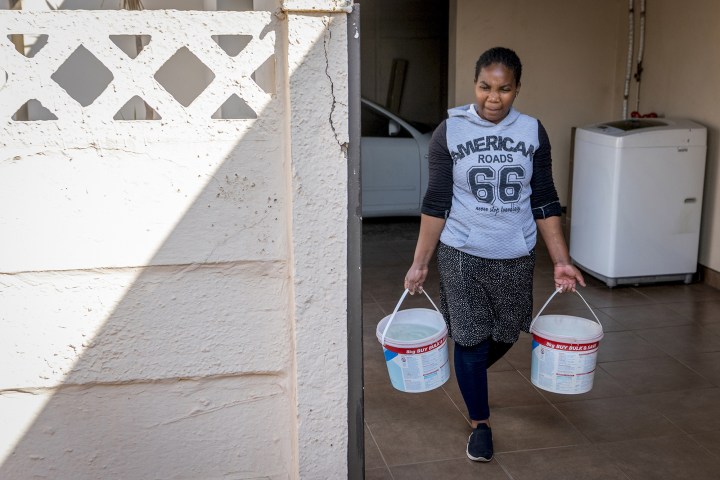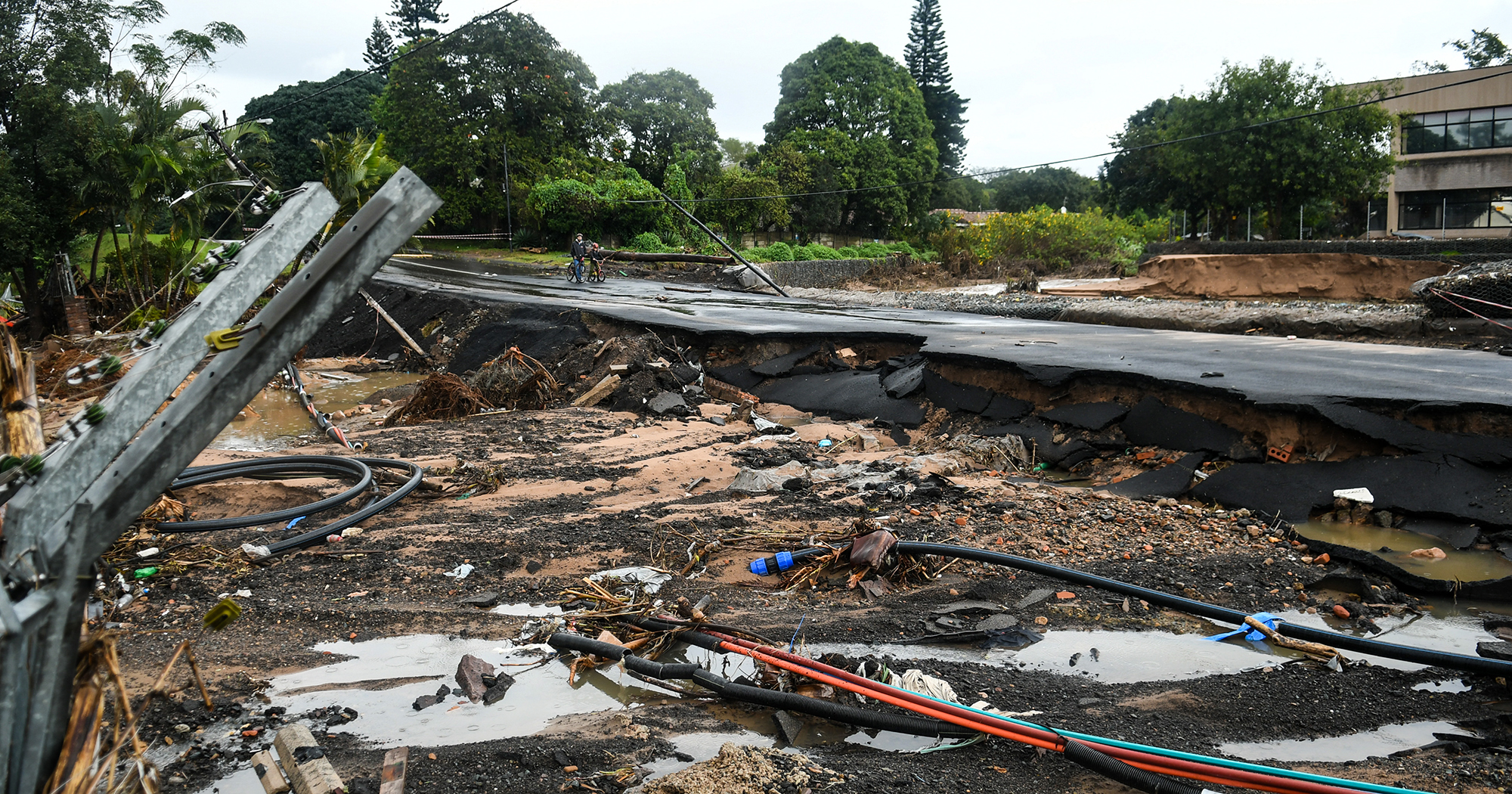DAM DISASTER
South Africa’s crumbling, neglected water systems are vulnerable to floods and other climate impacts – report

South Africa’s failure to put money into maintaining ageing supply infrastructure increases the threat posed by disasters such as the floods in KwaZulu-Natal, says a report to Parliament.
Lack of investment in the maintenance of ageing infrastructure, resulting in huge water losses, will result in South Africa being more vulnerable to climate impacts.
This is according to an assessment by the Department of Performance, Monitoring and Evaluation (DPME) that was presented to a meeting of the parliamentary Portfolio Committee on Water and Sanitation last week.
“This was an eye-opener for us,” said Mpho Banda, a local government sector expert at the DPME.
“Infrastructure is not adequately managed and adequately maintained. There is a possibility that there are many other critical infrastructures throughout the country that are important for disaster management that are not being adequately addressed.”
The DPME assessed the work of the Department of Water and Sanitation (DWS) and other water entities for the 2021/22 financial year.
After evaluating the key water and sanitation performance standards at municipal level, it found that many municipalities focused on expanding access to water at the expense of repairs and maintenance.
Read in Daily Maverick: “Corruption and fraud sends South Africans down the drain”
The DPME highlighted trends of underexpenditure and underinvestment in repairs and maintenance, leading to ageing infrastructure and consequent water losses. It reported that the average water loss across South Africa is 50%, above the norm of 30%.
Access to water declines
Banda said that, despite the percentage of households with access to an improved source of water increasing from 84.4% to 89.1% between 2002 and 2020 (according to Statistics South Africa), the DPME found that access to water had declined in six provinces between 2002 and 2020, with the largest drops in the Free State, Limpopo and Mpumalanga.

Roads and infrastructure destroyed in Pinetown after heaving flooding on 22 May 2022 in Durban, South Africa. (Photo: Gallo Images / Darren Stewart)
About a third (30.8%) of South African households had reported some sort of water supply dysfunction in 2021.
Although the DWS had made some progress, such as investing in new infrastructure, Banda said existing infrastructure was being neglected, which was contributing to water loss.
Read in Daily Maverick: “We need a 4IR shift in our approach to SA’s multiple water-related crises”
When the DPME looked at the spending of the Municipal Infrastructure Grant – intended to eradicate municipal infrastructure backlogs in poor communities to ensure people have access to basic services such as water – it found that municipalities spent R11.8-billion, only 75% of what they had been allocated by the grant in the 2021/22 financial year.
“These underexpenditure trends have also contributed to the huge backlogs that we see in the rehabilitation of the ageing infrastructure,” said Banda, “and I think the underinvestment [in] repairs and maintenance by the water service authorities has led to high water losses.”
The DPME recommended that the Portfolio Committee on Water and Sanitation support critical infrastructure investments in the water sector and that the DWS establish mechanisms to address the backlog in maintenance.
Avoidable water losses
Joelene Pillay, Auditor-General South Africa senior manager, said in her presentation of the audit of the DWS that the lack of maintenance of infrastructure had contributed to avoidable water losses and affected the reliable delivery of water.
“Inadequate maintenance will result in a shorter lifespan of assets and therefore increased costs in replacing assets sooner, and will result in dilapidated infrastructure that may not be able to meet the demands of the population,” Pillay reported.
She recommended that “a national action plan be developed and implemented by coordinating departments and entities, led by the DWS, to ensure that root causes identified are addressed in a timely manner”.
Some of the problems municipalities face are caused by rapid and unplanned urbanisation, putting a huge strain on existing infrastructure.
Read in Daily Maverick: “New agency to fund, fix and expand South Africa’s vital water infrastructure”
However, this isn’t the only factor putting pressure on ageing infrastructure. Climate change has increased and intensified climate events that could threaten water security if South Africa lacks the infrastructure to deal with them.
The Sixth Assessment Report of the Intergovernmental Panel on Climate Change said: “Human influence is making extreme climate events, including heatwaves, heavy rainfall and droughts, more frequent and severe.”
Banda said the DPME had made site visits after flooding hit KwaZulu-Natal in April, “described as a ‘once-in-200-years rainfall event’ ”, to assess the impact the disaster had made on water infrastructure and on residents’ supply of water.
“When we went with the engineers on the ground, we found that, in fact, some of these problems that resulted during the flood… could have been avoided,” said Banda.
Visit Daily Maverick’s home page for more news, analysis and investigations
The department had visited sites in the eThekwini Municipality, Tongaat, the iLembe Municipality, Stanger and Shakas-kraal and found that Tongaat’s water infrastructure had been “totally wrecked”. The water treatment plant there had been having problems even before the floods and lacked compliance with the statutory regulations stipulated by the DWS.
The site inspections had also discovered sluice gates that were heavily corroded and not operational at the time of the floods. They found that municipalities had responded poorly when it came to opening sluice gates to allow water to pass through when it had reached high levels in storage facilities. If that had been done, the flooding of houses could have been averted.
Disaster risks
The DPME recommended that municipalities prioritise the infrastructure needed to cope with disaster risks. “The infrastructure that is important for disaster management control needs to be prioritised to accommodate the current climate change conditions,” said Banda.
The Auditor-General highlighted inadequate flood relief in eThekwini, reporting that many areas of KwaZulu-Natal had been left without water because of damage to water infrastructure.
In the briefing, Pillay said: “Response to providing water to residents in affected areas to meet basic human needs was inadequate as many communities went days before water was made available.”
Read in Daily Maverick: “Poor climate adaptation, outdated infrastructure served as catalysts for KZN floods”
The Auditor-General reported that 83% of communities in eThekwini did not receive water for at least a day and 57% did not receive water for more than three days.
It said that three spheres of government – the eThekwini Metro, the KwaZulu-Natal department of cooperative governance and traditional affairs, and the DWS – had not ensured that resources were used effectively, and that they had used the emergency as a reason for not following proper procedures. DM168
This story first appeared in our weekly Daily Maverick 168 newspaper, which is available countrywide for R25.






















 Become an Insider
Become an Insider
Comments - Please login in order to comment.